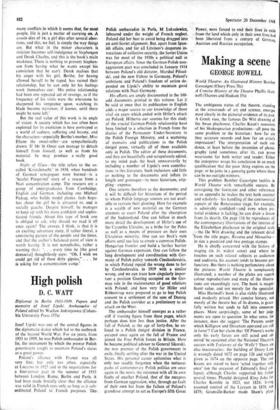High polish
D. C. WATT
Josef Lipski was one of the central figures in the diplomatic dance which led to the outbreak of the Second World War. For six years, from 1933 to 1939, he was Polish ambassador in Ber- lin, the instrument by which the prewar Polish government sought to maintain Poland's status as a great power.
Poland's alliance with France was all very fine; but only too often, especially at Locarno in 1925 and in the negotiations for a four-power pact in the summer of 1933 between London, Rome, Berlin and Paris, it had been made brutally clear that the alliance was valid in French eyes only so long as it sub- ordinated Poland to French purposes. Ther Polish ambassador- in Paris, M Lukasiewicz, laboured under -the weight of French neglect.
Poland-did her best to avoid being dragged into an anti-Soviet.alignment But, apart from Span- ish affairs, and for all Litvinov's desperate in- vocations of collective security, the Soviet Union was for most of the 1930s a political null in European affairs. Since the German-Polish non- aggression pact was concluded in January 1934 between Poland's old dictator, Marshal Pilsud- ski, and the new Fiihrer in Germany, Poland's ambitions and Poland's freedom of action de- pended on Lipski's ability to maintain good relations with Nazi Germany.
His efforts are amply documented in the 160- odd documents printed in this volume. Let it be said at once that its publication in English adds a major source to our knowledge of those vital six years which ended with Hitler's attack on Poland. Hitherto our sources for this study of the crucial German-Polish relationship have been limited to a selection in French from the diaries of the Permanent Under-Secretary in the Polish Foreign Ministry, and a scattering of memoirs and publications in the Pcilish émigré press, virtually all of them available only in Polish. The editor of these documents, and they are beautifully and scrupulously edited, to my mind pads the book unnecessarily by including a number of Lipski's own contribu- tions to this literature. Such inclusions add little or nothing to the documents and inflate its length and grotesque—to most historians, crip- pling—expense.
One returns therefore to the documents; and it will be difficult for historians of the period to whom Polish language sources are not avail- able to restrain their gloating. Here for example is a wealth of new material on the German attempts to court Poland after the absorption of the Sudetenland. One can follow in much more detail the development of Hitler's use of the Carpetho Ukraine, as a bribe for the Poles as well as a means of pressure on their own Ukrainian minority. One can see Beck's vain efforts until too late to create a common Polish- Hungarian frontier and build a further barrier against German expansion. One can follow the long development and coordination with Ger- many of Polish policy towards Czechoslovakia, in which Poland repaid the wrong done to her by Czechoslovakia in 1919 with a similar wrong, and we can trace how singularly impor- tant a position Goering occupied on the Ger- man side in the maintenance of good relations with Poland; and how very far Hitler and Ribbentrop were prepared to go to buy Polish consent to a settlement of the uses of Danzig and the Polish corridor as a preliminary to an attack on the West.
The ambassador himself emerges as a rather stiff if trusting figure from these pages, which perhaps does him less than justice. After the fall of Poland, at the age of forty-five, he en- listed in a Polish émigré division in France, escaped once again on the fall of France and joined the Free Polish forces in Britain. Here he became political adviser to General Sikorski, the new premier of the Polish government in exile, finally settling after the war in the United States. His personal career epitomises what is only too readily forgotten when the tortuous .paths of contemporary Polish politics are once again in the news; the existence with all its own faults of another Poland, that of the escapees from German aggression, who, through no fault of their own but from the failure of Poland's grandiose attempt to act as Europe's fifth Great
Power, were forced to end their lives in exile ,--efrosn the land which only in their own lives had been liberated from a century of German, Austrian and Russian occupation.


































 Previous page
Previous page